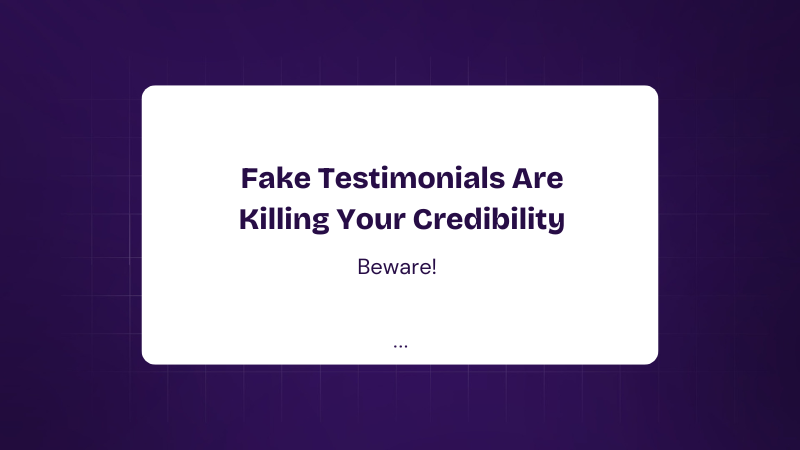The “Too-Good-To-Be-True” Trap
Picture this: You stumble upon a website claiming to have the best product on the market. As you scroll down, you’re met with glowing testimonials that sound suspiciously like they were written by the same overenthusiastic intern.
“This product changed my life!”
“I’ve never been happier!”
“I lost 50 pounds overnight and became a millionaire!”
Okay, maybe not that last one, but you get the idea. The problem? They feel fake. And the moment a customer senses dishonesty, trust evaporates faster than a raindrop on a summer sidewalk.
Fake testimonials may seem like a harmless shortcut to social proof, but in reality, they’re a ticking time bomb for your brand’s credibility. Let’s break down exactly why they’re so damaging and what you should be doing instead.
Customers Can Smell a Fake a Mile Away
The modern consumer isn’t stupid. People are more skeptical than ever, thanks to years of being bombarded with exaggerated marketing claims, clickbait ads, and, yes—phony testimonials.
In fact, according to a 2022 study by BrightLocal, 77% of consumers say they read online reviews before making a purchase, and a staggering 89% say they trust online reviews as much as personal recommendations (source: BrightLocal).
But here’s the kicker—when testimonials seem too polished or unnatural, customers immediately start questioning their authenticity. The phrases are too generic, the language is overly formal, and worst of all, there are no real names or photos.
🔹 Real-life example: In 2019, skincare brand Sunday Riley was caught directing employees to post fake reviews on Sephora. The backlash was swift, with angry customers calling them out for deception. The company’s reputation took a serious hit (source: The Verge).
When you lose trust, you don’t just lose one customer—you lose many. And regaining credibility? That’s a mountain climb.
Fake Testimonials Can Backfire Legally
If ethical concerns don’t scare you, perhaps the legal consequences will.
In the U.S., the Federal Trade Commission (FTC) takes misleading testimonials very seriously. Under its guidelines, any fake or deceptive review can result in hefty fines and legal action.
🔹 Case in point: In 2021, the FTC fined Fashion Nova $4.2 million for suppressing negative reviews and posting only positive ones (source: FTC.gov).
The European Union has also cracked down on fake testimonials under its Unfair Commercial Practices Directive. And with AI tools making it easier to detect fraudulent reviews, businesses that fake it are at higher risk of exposure than ever before.
👉 Lesson learned? If you can’t back up your claims with real customer experiences, don’t make them.
Fake Testimonials Create a Trust Deficit
Even if you manage to avoid legal trouble, fake testimonials chip away at long-term trust. Once customers feel deceived, they start questioning everything about your business:
- If the reviews are fake, is the product even good?
- What else is the company lying about?
- Can I really trust them with my money?
When trust erodes, customers leave. And worse—they tell others about it.
🔹 Example: A Harvard Business Review study found that a one-star decrease in a company’s rating on Yelp can result in a 5-9% drop in revenue (source: HBR).
Would you risk that just for a few fake glowing reviews?
The Snowball Effect: How Fake Testimonials Destroy Brand Reputation
Here’s the thing: once you start using fake testimonials, it’s hard to stop.
You might get a temporary boost in conversions, but eventually, real customers will start leaving genuine reviews—and if their experiences don’t match the fake ones, you’re in trouble.
Let’s say your fake testimonials promise “life-changing results,” but real customers find your product mediocre. Soon, they start leaving honest but negative reviews, and your credibility takes a hit.
🔹 Example: Amazon has been battling fake reviews for years. In 2021, they banned over 200 Chinese brands for engaging in fraudulent testimonial schemes (source: CNBC). The result? Massive financial losses and destroyed reputations.
The reality is simple: You can’t build long-term success on deception.
Authentic Testimonials: The Right Way to Build Credibility
So, if fake testimonials are a disaster waiting to happen, what’s the alternative? Genuine, verifiable customer feedback.
Here’s how to do it right:
✅ Encourage real customers to leave honest reviews. Offer incentives like discount codes for verified reviews—but without dictating what they should say.
✅ Use testimonials with details. Instead of generic praise, showcase testimonials that describe specific benefits. (e.g., “After using this app for a month, my productivity improved by 40%.”)
✅ Feature user-generated content. Videos, social media posts, and case studies from real customers add authenticity.
✅ Respond to negative feedback professionally. Instead of deleting bad reviews, address them with transparency. A well-handled complaint can actually build more trust than a perfect five-star rating.
🔹 Example: Airbnb publicly addresses negative reviews by responding to customer complaints with resolutions. This level of transparency reassures potential customers (source: Airbnb).
FAQs
Can fake testimonials actually help a business?
Temporarily, they might boost sales, but in the long run, they almost always backfire by eroding trust and credibility.
How can I tell if a testimonial is fake?
Look for vague language, stock photos, overly positive phrasing, and a lack of verifiable details.
What are the legal consequences of fake testimonials?
In the U.S., the FTC can fine businesses for deceptive testimonials. In Europe, companies can face legal penalties under consumer protection laws.
What should I do if I find fake reviews on my website?
Remove them immediately and focus on gathering authentic customer feedback instead.
Are all testimonials reliable?
No. Even real testimonials can be biased. That’s why looking at a mix of reviews—including both positive and negative—provides a clearer picture.
Final Thoughts: Authenticity Wins Every Time
Fake testimonials might seem like an easy way to boost credibility, but in reality, they do the exact opposite. Consumers are smarter than ever, regulators are cracking down, and bad reputations spread like wildfire.
Instead of gambling with deception, focus on real, authentic social proof. Because in the end, trust isn’t just a marketing strategy—it’s the foundation of a successful business.



